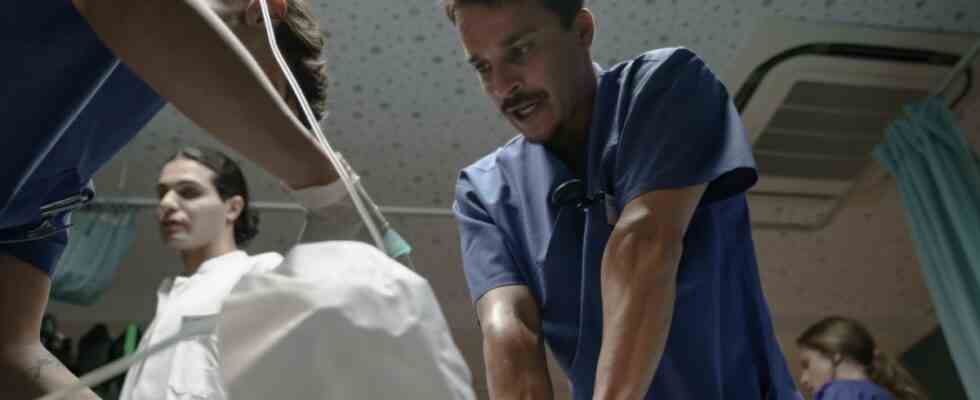There is blood on Rico’s hands. As the nurse tries to revive a patient, the scar on his chest ruptures. No time to clean up, the fight must go on. It is already the third person in the intensive care unit who has to be treated with cardiac massage on this night, the storm surge night, as the nurses call it. And not the last, the alarm goes off five times. It’s a good thing that the “super resuscitator” Rico Weber (Kostja Ullmann) is on duty. But then, looking down at his bloodstained hands, his face twists into a grimacing, crooked smile. Does Rico like the fight for life – with him in the role of the godlike savior?
The film The white silence by director Esther Gronenborn takes a true story as a template: the story of the serial offender Niels Högel, who became known as the “death nurse”.. The nurse injected his patients with drugs that caused circulatory failure, for example, so that he could then resuscitate them, i.e. “save them”, which he did not always succeed in doing. He was proven to have committed 85 murders, and the psychiatric expert attested to Högel’s narcissism and tendency to always want to be the center of attention. He was sentenced to life imprisonment in 2019.
The storm surge night pretty much marks the middle of the film, which was produced for RTL+ and also premiered at the Munich Film Festival. In a few months it will also be available on Vox free TV. This night is the tipping point where even the last viewer should have noticed that Rico is not the “popular colleague”, the “super resuscitator” as he is introduced in the film. Clara Horn (Julia Jentsch) also finds Rico very sympathetic when she is newly divorced and returns to the ward after years of parental leave. The two quickly end up in bed. But over time she becomes suspicious, she notices that during Rico’s shifts significantly more patients than usual have to be resuscitated. But when she shares her suspicion, it quickly becomes clear to her: the clinic management and colleagues have no interest in clarifying the matter. On the contrary, Clara shouldn’t disturb the image of the station and the peace. But she begins to track down her colleague, and the film accompanies her very closely. With the nice effect that Rico becomes a supporting character in his own series of murders.
The film avoids the danger of actively participating in the perpetrator becoming a hero
This trick is an intelligent way out of a trap that everything called true crime often falls into: helping to tinker with the perpetrator’s becoming a hero, which becomes even more problematic when the desire to be the center of attention may have been a key murder driver . The white silence treats his real template much more appropriately than the true crime documentary, which can also be streamed on RTL+ The Death Nurse, in which Högel was added via telephone interview and a stage prepared for him. If you want to approach the material less luridly: The Sky documentary series Black Shadow – serial murder in the hospital quoted from the police interrogation records, with victims and police officers speaking. Also the ARD documentary Black Shadow: The serial killer Niels Högel deals with the murder series.
And now a feature film. Can fictionalization contribute anything new at all? She can. Because of The white silence As consistently as it marginalizes the perpetrator, the film seeks further explanations for his actions – and he also finds these in structural problems in the healthcare system. Nursing shortages, staff shortages, the nurses are constantly talking about it. The time pressure at work is the first thing Clara is drilled into when she returns to work. Shortly before the end of the film, a reporter speaks into a microphone: “In addition to the personal question of guilt … we are concerned with the question of whether a system in which profit maximization takes priority over patient welfare and the nursing shortage is already priced in does not have a certain share in the course of the terrible events?”
Clara Horn (Julia Jentsch) becomes suspicious and researches her colleague.
(Photo: RTL+)
Now the nursing shortage is an undisputed fact, which also played a role in the real Högel case. The film itself clearly addresses the nursing shortage, but does not make the connection to the series of murders. In other words: It is hardly clear that Rico has to work night shifts all by himself and can do his mischief undisturbed. Nor can it, after all, the film adopts the Clara perspective so strictly that the viewer can only see the moments in which she is involved.
And although the film wants to be a psychological thriller, boredom begins to set in at times. Which also has to do with the fact that the court case is already introduced in the first scene, to which later cuts are repeatedly made from the coolly filmed everyday clinical routine. So the bad guy will be caught, you know that immediately. From the very good idea of not wanting to prepare a stage for the perpetrator, it follows that tension should have been generated in a different way. Tension stays in The white silence a subjunctive. In the end, the film trips itself up.
The white silence on RTL+.

